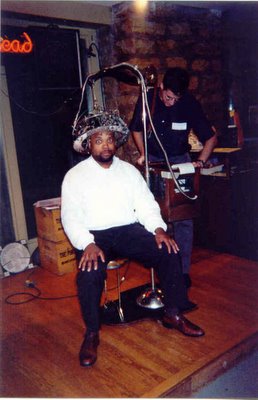I am one with The Matrix...

See you in '06 with lots more Digability!!!
Sneak inside search engines, find hidden resume treasure troves and discover top secret tactics for finding the perfect candidate.

See you in '06 with lots more Digability!!!

Here is a head's up on a new tool but, is it cool? Peep the hype from their website.

Jookster is a powerful search engine that ranks results based on sites you and your network finds of value. With Jookster, you are able to search the web and find relevant results based on jooked sites by you and your network of friends. In return when you see a great site, you can jook and instantly share it with your network.
What does it mean to "jook"?
Jooking is the process of identifying and marking valuable websites on the Internet. Using the Jookster Toolbar or Links Button everytime you find a valuable site, you jook it. After marking these sites, you and your network can search and retrieve information from them anytime. The more valuable sites you and your network jooks the better your future search results will become.
How does Jookster work?
What browsers and operating systems does Jookster support?
Jookster has been tested to support Firefox, Safari and Internet Explorer 5.0 or greater browsers. Jookster supports Windows, Macintosh, Linux and Unix operating systems.
Why would I want to use Jookster over other search engines?
Today searching for information on the Internet can be a hit or miss process. This happens because sites do not have any information about you and what you are interested in. Jookster allows you and like-minded people to identify or "jook" the most valuable content on the web. This results in less time spent looking at irrelevant content and more time finding information that is helpful to you.
The idea behind Jookster is that people who you share common interests with can help each other filter the web’s content. For instance if you and your friends are video game fans and you search on the term “Halo” you will get content specific to the popular Xbox game because your friends from your Jookster network will have likely jooked video gaming sites. On the other hand if you and your friends are divinity students and you search on the word “Halo” then you will get very different search results because your friends will have likely jooked divinity sites. The people in your personal Jookster network help give meaning to specific results because they know you and share common interests with you.
***
Digability rating: It is what it is.
Community web search seems to be a growing trend (see Eurekster for another example), but no one has done it well enough to get me really excited. I guess because for it to really, really work it has to depend on how well your network of community searchers are willing to contribute. If you have a few co-workers working with you, will it really make a dent in your long-term initiatives?
Think of it this way, how many sourcers across the country will be willing to search together for resumes and share the results when (in all probability) they will be in competition with each other.
Still, for non-recruiters, I could see how this could prove interesting, so I will not poo-poo it. I will simply bring it to your attention.

...snip-snip...
READ: http://www.talis.com/downloads/white_papers/DoLibrariesMatter.pdf

 Vacation’s over. You’ve had a grand time: intriguing locales, fun events, delicious food, memorable moments. You’re relaxed, your batteries recharged. Life is good.
Vacation’s over. You’ve had a grand time: intriguing locales, fun events, delicious food, memorable moments. You’re relaxed, your batteries recharged. Life is good. You get home and fire up your laptop to see how things have been going at work while you were gone. That’s when you’re accosted by grim reality: hundreds upon hundreds of e-mails, each demanding your attention, your action, your time. How can you even begin to sort through this informational assault? Panic and dread set in. Vacation’s really over.
Unless you have SNARF, that is.

SNARF, the Social Network and Relationship Finder, developed by Microsoft Research and available for download, is designed to help computer users cope with precisely such scenarios. SNARF, a complement to e-mail programs such as Outlook, filters and sorts e-mail based on the type of message and the user’s history with an e-mail correspondent. The result: a collection of alternative views of your e-mail that can help you make sense of the deluge.